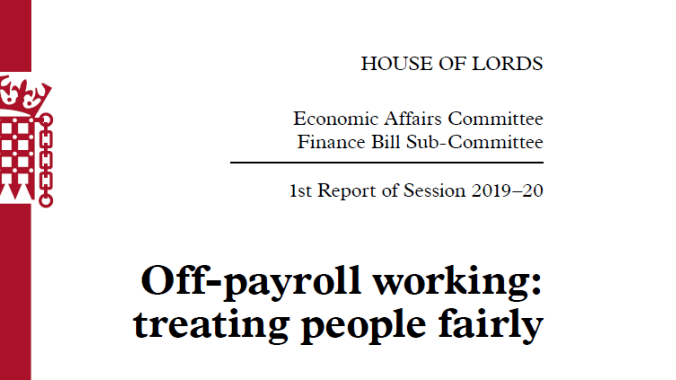In its report issued today title Off-payroll working: treating people fairly, the economics affairs committee of the House of Lords has slammed the proposals to extend the off-payroll working rules into the private sector, and urged the Government to now use the time due to its announced delay to completely rethink the legislation.
The Lords heard considerable evidence over the course of it's inquiry and concluded in the reports summary that "....the IR35 rules — the Government’s framework to tackle tax avoidance by those in ‘disguised employment’ — have never worked satisfactorily, throughout the whole of their 20-year history. We therefore conclude that this framework is flawed."
Lord Forsyth of Drumlean, Chair of the House of Lords Economic Affairs Finance Bill Sub-Committee, said that the Committee welcomed the Government's decision to defer these off-payroll working rules in the wake of the Covid-19 pandemic, but expressed considerable concern: "Our inquiry found these rules to be riddled with problems, unfairnesses, and unintended consequences. The potential impact of the rules on the wider labour market, particularly the gig economy, has been overlooked by the Government. It must devote time to analysing all of this. A wholesale reform of IR35 is required.
In the report the Lords highlighted that:
- Off-payroll rules build on a flawed system—IR35
- The Government severely underestimated the costs to business of implementing the changes
- It did not take full account of concerns raised by stakeholders
- It did not analyse sufficiently the unintended behavioural consequences of the proposed reforms
- It is likely that the off‑payroll changes will cause widespread disruption
- Recognised the creation of a 'halfway house' of “zero-rights employees”
- The Government should use the delay time to analyse holistically the problems uncovered.
- Questioned whether the CEST tool is fit for purpose
Why now?
The report summary concluded by observing that the UK economy is facing its most severe crisis since the Second World War, and that even if the economy were to begin to recover in the next 12 months, the severity of the economic impact of COVID-19 is so great that it would be completely wrong for the Government to impose a new burden on business in the form of the existing off‑payroll proposals.
Forsyth says: "The rules were deferred for a year because of the current crisis, but how prepared will businesses recovering from the crisis be to take on this extra burden on next year? The Government needs to think this through very carefully. We call on the Government to announce in six months' time whether it will go ahead with reintroducing these proposals."
The Committee recommended that to give certainty to business, the Government should announce by October 2020 whether it will indeed implement the off‑payroll rules in April 2021, or whether any on-going impact to the economy resulting from the COVID-19 pandemic will require their implementation to be delayed further.
Chaplin agrees: “The legislation is obviously contentious amongst MPs given that it was pulled out of the order of today’s reading of the Finance Bill. UK industry is currently on its knees due to the COVID-19 crisis, and will need the help of the UK’s flexible workforce to get back on its feet as we emerge from this crisis and that is going to take some time. Now is not the time to apply a straight-jacket.”
Report references
- Report: Off-payroll working: treating people fairly (PDF)
- Report: Off-payroll working: treating people fairly (HTML)
- Inquiry: Draft Finance Bill 2020
- Finance Bill Sub-Committee
Stop the Off-Payroll Tax : Join the Campaign
With the roll-out delay currently proposed until at least April 2021, and the Lords urging Government not to include the reforms in the Finance Bill currently working it's way through Parliament, the campaign needs your help to spread that message to MPs.
You can join 3,000 other campaigners and help make difference by signing up to the Stop The Off-Payroll Tax campaign.

